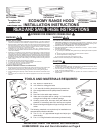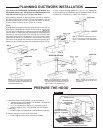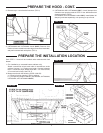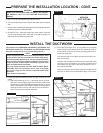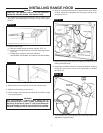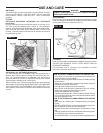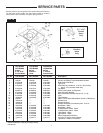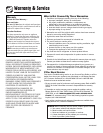
4
INSTALL THE DUCTWORK
PREPARE THE INSTALLATION LOCATION - CONT.
WARNING
WHEN CUTTING OR DRILLING INTO WALL OR CABINET,
BE CAREFUL NOT TO CUT EXISTING ELECTRICAL
WIRING.
FIG. 6
FIG. 8
FIG. 7
3. Use 1-1/4" bit to drill opening for electric wiring.
4. Cut out duct opening in wall or cabinet with saber saw or keyhole
saw.
5. Center hood in installation opening and trace keyhole slots onto
wood filler strips on cabinet bottom.
6. Screw four #10 x 7/8 wood screws into exact center of narrow
end of traced keyhole slots. Allow 3/8" of screws to project, so
that hood can be fitted into place later.
(This section for UXT2030AA, UXT2036AA, UXT3030AA, and
UXT3036AA hoods ony. UXT4030AA and UXT4036AA hoods
skip this section and go on to "Install Range Hood".)
NOTE
These instructions will follow plans made on Page 2. Start
at the exterior and run ductwork back to the range hood.
For best possible performance, use the shortest possible
duct run and a minimum number of elbows. Do not vent a
range hood into an attice space. A buildup of grease in the
attic could become a fire hazard.
Use only metal ductwork. DO NOT USE PLASTIC DUCT.
Assemble duct run securely so that in case of a grease
fire on the range, the fire will be contained inside metal
ductwork.
Tape all duct connections.
2. Follow appropriate directions below for type of duct run you
install.
a.) Wall Cap Discharge; (FIG. 7) Use saber saw or keyhole
saw to to cut hole slightly larger than duct size used so that
duct will line up easily with damper/duct connector on hood.
Install casing strips if cap will be installed on siding. Attach
required amount of duct to wall cap and run duct back to
hood. Fasten cap to wall and caulk well.
b.) Roof Cap Discharge: (FIG. 8) Cut a hole in roof slightly
larger than duct size being used. Run ductwork down to
hood location. Leave 3/4" of duct projecting above roof
surface on high side.
Trim duct parallel to roof pitch and seal all around duct
with roof cement.
Carefully trim shingles and slide back of roof sheet under
shingles. Nail roof sheet to roof under shingles at top
two comers and two sides. Nail sheet directly to roof in
four places at bottom.
Using roof cement, seal all nail heads and shingles which
were cut or lifted. Do not seal bottom edge of roof sheet.



